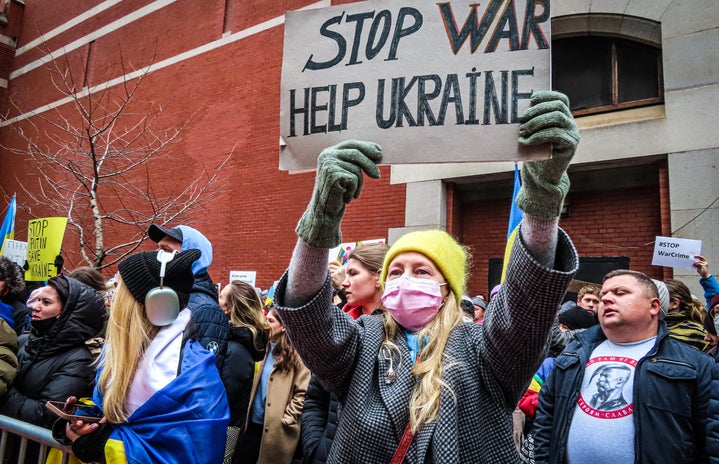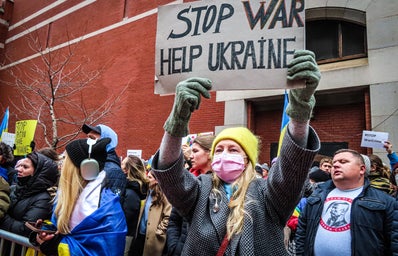The world has been watching a war unfold over social media
On February 24th 2022, Russia officially attacked the nation of Ukraine. Just one day earlier, after much conflict between the two countries, Ukraine declared a state of emergency. While Ukrainian citizens and others stuck in the country have been fleeing, President Volodymyr Zelensky has chosen to stay behind and fight along with soldiers. Many feel that as much as it is a war between Russia and Ukraine, it is more of a war between Russian President Vladimir Putin and Ukraine with many Russian citizens not agreeing with the actions of their president. In the hopes of fighting back, Zelensky announced that Ukrainian prisoners with military experience could be released.
Many nations across the globe have taken actions against Russia in support of Ukraine in the form of sanctions and essentially blocking Russia from the rest of the world. After a 207 year neutrality, Switzerland joined the EU in sanctions against Russia, a move that surprised many. Russia’s currency the Ruble has seemed to face the consequences of Putin’s actions as said in this article from CBS “The ruble fell about 30% against the dollar…after the U.S., European Union and the United Kingdom announced moves to block some Russian banks”. Israeli Prime Minister Naftali Bennett has stepped into the role of mediator after meeting Putin in Moscow to discuss ending the war and later talking to Zelensky about the way forward. On home soil, the Russian Embassy in South Africa tweeted their thanks to all the South Africans who have shown support and stood in solidarity with Russia.
In the modern times, we live in today, people around the world have been watching the war unravel across various social media platforms. Many have taken to social media platforms to share their thoughts and feelings. Fashion designer Natalia Fedner shared her thoughts on the war in a post saying “It’s not about being pro-Russia or pro-Ukraine. It’s about being pro Peace and pro-Democracy.” As is with anything around social media there have been good and bad aspects. Watching a war in the digital age is unlike any other usual experience of war.
Some of the positive aspects have been the direct access to links websites for donations and support which has increased global awareness. However with direct access to social media platforms also comes the live and real footage of those affected by the war. These videos and live streams which many have been found hard to watch for many. Life on social media also means reading a post on how to support Ukraine and then scrolling down to a BuzzFeed article.
When the whole world has come together in support of Ukraine, many are asking where this global support was for the Middle East and West Africa. Places such as Palestine, Iraq, Libya, Syria and Afghanistan have shown support for Ukraine whilst they too are fighting wars. Amidst the war, many injustices have come to light, such as the racism felt by African and Indian civilians trying to flee Ukraine. According to a Twitter thread by AJPLUS, “The EU gave protected status to people fleeing Ukraine — but that does not apply to thousands of foreign students…many from mostly India or African countries report racism at borders”. Whilst many Ukrainian citizens were able to enter Poland, Nigerian students were apparently denied access.
In a recent segment of The Daily Show, Trevor Noah highlighted racist comments by many reporters covering the war. In talking of Ukrainian citizens, Al Jazeera English’s Peter Dobbie said “these are prosperous, middle-class people”. CBS News reporter Charlie D’Agata said that Ukraine isn’t “a place with all due respect…like Iraq or Afghanistan…this is a relatively civilized, relatively European”. Another reporter added, “This is not a developing third world nation—this is Europe.”
As the world continues to support Ukraine and hope for the end of the war, we must remember that there are many communities of people struggling through wars and conflicts that do not receive the same global support.


